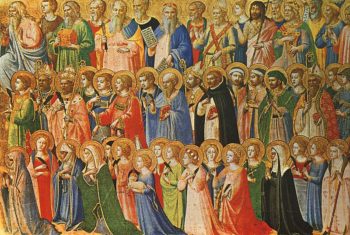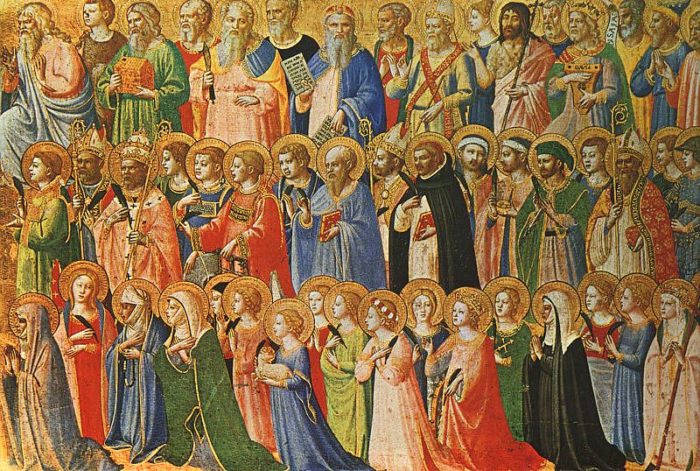Everyone knows about All Saints’ Day, principally because it comes right after Halloween. All Saints’ Day was instituted to commemorate all the saints in heaven, known and unknown, and to emphasize the oneness of the Church in heaven and the Church on earth, the Church Triumphant and the Church Militant. It’s a lovely idea. It’s a pity it never really caught on.
Our culture enthusiastically took up Halloween, with all its emphasis on death and the darker side of spirituality. All  Saints’ Day, with its brighter spirituality and emphasis on life after death, never gained a place. There is a great deal of opportunity for social commentary in that fact. Probably too much, actually. The celebration of Halloween, and the neglect of All Saints’ Day, have a tangle of causes. Prominent among them is the human need for the concrete. The most spiritual celebrations require material rites, or they will never be popular. We all know what you might do to celebrate Halloween. No one can think of what you might do to celebrate All Saints’ Day except go to church, if you can find a church that’s open.
Saints’ Day, with its brighter spirituality and emphasis on life after death, never gained a place. There is a great deal of opportunity for social commentary in that fact. Probably too much, actually. The celebration of Halloween, and the neglect of All Saints’ Day, have a tangle of causes. Prominent among them is the human need for the concrete. The most spiritual celebrations require material rites, or they will never be popular. We all know what you might do to celebrate Halloween. No one can think of what you might do to celebrate All Saints’ Day except go to church, if you can find a church that’s open.
All Saints’ Day lacks the universal expressions of human celebration: food, decorations, some convivial custom such as presents or costumes. The holiday also lacks stories. Christmas bursts with the Christmas story, in carols and readings and manger scenes. Easter has an even grander story, evoked in the simplest of images: a bare cross, a tomb with the stone rolled to the side. Halloween lacks the one overarching story, but it has a boisterous anarchy of minor ones. Even the Fourth of July, purely secular, comes in the name of a story. Every holiday has its story, or stories.
What is the story of All Saints’ Day? The saints in heaven, the unity of the Church, are ideas, and – however lovely – abstract ideas. What stories could we tell? Some people trace the holiday to the commemoration of the martyrs in the Roman Empire; there is an abundance of stories there. But the stories of the martyrs are often ghastly, a too-exquisite rendering of physical pain thickly overlaid with spiritual sentiment. The lives of the saints would be more cheerful material, but even less to the point. The heart of All Saints’ Day is not the lives of the saints, or their deaths, but their life after death. It is heaven.
Heaven eludes us in our stories. There are a million good stories about about ghosts and goblins and witches, if you go in for that sort of thing. Have you ever heard – could you even imagine – a riveting story about the perfected saints in heaven? Not even the great masters did heaven credit. Milton’s hell outshone his heaven; Dante made a name for the ages with Inferno, not paradise. Those writers who touched heaven most effectively – C.S. Lewis, Tolkien – did so by suggesting glories they did not try to tell. I’ve never seen a portrayal of heaven that didn’t seem hollow and colorless.
We don’t know what heaven is. It seems we can’t imagine it, either. Our stories, like our imaginations, fail in this place. It’s a pity; stories of heaven should be among the best stories. They are, maybe, too good to tell.









































Several things–we humans have so much more experience with suffering than with true bliss that I think it’s easier for us to describe the one then the other.
The second thing is we are keenly interested in conflict. Heaven seems to have none. We know we will enjoy it, but it can be hard to imagine what we will do once all conflict is gone.
I think though we very well might be creating new works of art in eternity–there certainly is a pleasure in creating that does not require any conflict or hardship to be enjoyable…
It’s more pronounced in my yarn hobby, but part of my delight in creating lies in exerting my will upon reality and bringing forth a thing by the force of my determination and skills.
Will doesn’t seem to be much of a thing about heaven. Rather the opposite, really, that we have no choice but to be good and joyful and possibly lobotomized.
But if these comments supported pics, I would post ones of my latest completed project so you might behold the form of my determination and skills.
I don’t think it’d be that we’d have no choice per se, more like there’s not any reason for us to suffer anymore and thus we just never end up being unhappy or hurting other people. That said, I dunno. There’s a difference between sadness/anger and actual suffering and sin. So maybe we could still feel a little unhappy about certain things without causing harm.
We’ll still have will, but our choice to find joy in Jesus down here will set us up for an eternity of infettered joy in Heaven. And I’m sure we’ll still be creating in Heaven, since God created us like Him.
I first read what you said here negatively–and there’s no doubt that there’s a negative aspect to what you said, a questioning of the value of heaven which implies a questioning of the goodness of God in what you said.
But then I realized you are making a legitimate point. It’s so hard to imagine us human beings having wills of our own and also us refraining from doing things that being good in heaven won’t allow. So it does sort of seem we’d have to have some sort of change in our minds and characters that someone might seriously wonder is a form of heavenly lobotomy.
But I think the Bible makes the case that we will be more than we are now in heaven, not less. That having new bodies not subject to sin in the same way will make it possible to have wills that are free but which simply do not want to do wrong–which is, presumably, how angelic beings are (the non-demonic sort).
We would still then be able to enjoy wending our creative wills on inanimate objects and enjoy shaping them into things our minds will think up.
Yeah!
An example of earth art we could still make in heaven would be drawings and sculptures and the like. Basically things that are pretty and bring joy or express what we felt in heaven, but wouldn’t be linked to our conflict on earth.
In an art appreciation class I took one time, it talked about an artist that believed that art shouldn’t express any viewpoint and instead be completely neutral that way people could simply enjoy it or interpret it as they wanted rather than feeling indoctrinated or whatever. I don’t agree with that sentiment(though if people want to make art like that it’s fine as long as they don’t force everyone else to) But the results would probably be something beautiful or interesting but maybe not something that has the trappings of all the bad things of earth. So maybe something like that could sort of work.
Or, instead of heaven art being about conflict we directly faced in the afterlife, it’d be art that commemorates our freedom from earthly conflict.
But I think we will still remember out earthly conflict. Perhaps our art, at least some of it, will be in memory of things that happened on the version of Planet Earth we know so well.
Certainly a great deal of art NOW is in memory of past events…
Without conflict the meaninglessness of our earthly lives becomes too apparent to hide from.
In Heaven, we will be consumed with Joy unspeakable and the Divine Glory. No need to struggle.
I think one major reason why we don’t have good stories of heaven is that we don’t think of paradise as being physical and grounded, even though that’s what the Bible claims it will be. Heaven isn’t the destination. The new earth is, with a new physical body devoid of the sin nature, where we will eat, play music, etc. Gnosticism destroyed people’s comfort with the physical, and the Christian culture has never quite recovered from it.
Travis mentioned the lack of conflict. He’s right. It’s hard to conceive of a no-conflict story that’s interesting. But other writers, like Ursula K. LeGuin, thought that stories needing conflict was an artificial limitation. And I’ve seen examples of eastern storytelling that positions a story without any interpersonal conflicts yet that’s still interesting.
Here’s a simple ex. “Man puts money into a pop machine. Machine starts to whir. Pop gets stuck halfway. Man narrows his eyes. Presses the button again. Pop starts moving again and finally gets to the bottom, where he grabs it, opens it, and drinks it. He smiles. A good day.” Imo that kind of story is still interesting to read. You may say the conflict was between him and the pop machine, but it might be better to think of it as goal, motivation, event, and response to how that event changed his behavior in an attempt to get to the goal. The “barrier” or “conflict,” could also be something GOOD that the character actually wants. Say, for example, that the pop machine drops two drinks instead of one, and so he has to find a home for the second in the hand of his friend. That kind of story could still happen in the New Earth, where there is no sin or death.
Notleia mentioned her thought that will would be lobotomized in heaven. But that’s not the way the Bible talks about it. That idea goes directly against the reason for God creating us to begin with (for his own worship, which MUST be voluntary). It’s also not been my personal experience of partial (though still profound) freedom from sin in this life. It’s not that we won’t have choice. It’s that we won’t WANT to do anything evil. That’s the freedom that Christ purchased for us in the next life–the freedom from the desire to do evil. We experience it in part in this life as we learn to love him and walk by his Spirit. We’ll still have full faculties to play this chord over this rhythm, to walk here, to speak with this person, to dance in this way, to eat this food, etc.
I agree a large part of the delight in creating (and this, I think, is a morally PURE delight) is “exerting my will upon reality and bringing forth a thing.” There’s nothing written about paradise that says that would no longer be available to us. In fact, I think we’ll be more focused on enjoying things such as these.
I’m pretty ambivalent whether lobotomy is true or the best metaphor, but I think that part of the problem is the perception that Heaven never changes in any significant manner. Even without traditional conflict, we expect a story to at least bring about change. Perfection does imply that, everything being optimal, nothing changes.
The Inuit seem to have pretty non conflict-type stories, but even a story about Partridge finding food gives us a change from being without to being with food and happy nice time.
I see what you’re saying and I think you’re right about the perception being the issue. But moral perfection doesn’t negate the opportunity for change. Example: a morally perfect person (hypothetically speaking) could still move from a smile to a smirk to full-on laughter. Life is complex, and if we call it the “afterlife,” we’re implying life remains life-like. Which means that there will always be an element of change. Even though God is “unchanging,” (in the sense that he’s always consistent with himself) the Bible has him moving from mad to happy to all sorts of things. Angelic beings move through the throne room (they’re “CHANGING” their position). And then there’s the emotional life of Jesus, the incarnation. For people who make the Bible the centerpiece of their lens through which to see the afterlife, I don’t see how they could come to the conclusion (from the text itself) that heaven=changelessness or lack of will. Yet again, that’s the problem that you pointed out. Most church-goers DO come to that conclusion… I believe erroneously.
I’m on board with most of what you said, though I don’t think imagining the New Earth being more earthly and less heavenly (so to speak) really changes much. If we are incapable of sin, that would make us quite different human beings than we are now. While I am all in favor of giving God the benefit of the doubt that he can produce unexpected things for us to do in that situation, the problem isn’t imagining the setting, it’s imagining US in that setting without us doing the sorts of things we so routinely do–sin-generating things, conflict-generating things.
I personally hope the New Earth is quite different from the current Earth. Because at least if it is even more beautiful and spectacular than nature as we know it now, we would know part of the reason why we’d find eternity enjoyable–we’ll be in awe of splendors of nature that go beyond anything we will have ever seen before.
It’s called the New Earth for a reason–precisely because it’s earthly. And I might be wrong, but I think it changes a lot. The New Earth will not be ethereal and ambiguous–it will be physical, emotional, and spiritual, and that matters to me even if it doesn’t to you or anyone else. The Gospel itself doesn’t conjure distant ambiguous images and tell us to be happy about it. The Gospel gives us real life entwined with Christ’s, the Light of mankind (Jesus’s personality and life) INSIDE our physical bodies. God’s gifts are tangible and real, and they evoke a real emotional, physical, and spiritual response. (Think of what the greatest commandment is, “love the lord your god with all your heart, soul, and mind”–he doesn’t just expect us to conjure up love based on nothing. Neither does he expect us to conjure love in ourselves based on some ambiguous understanding of a distant ethereal God [as an aside, it also doesn’t happen because of a smoke machine and some emotional sounding chords on a synth pad]. God conjures it through the personality and personhood of Jesus, and his personhood makes love bubble out of us [spiritually, emotionally, and physically in our behavior] when we focus on him; this is my experience of worship/prayer, and it is the most profoundly pleasurable experience that I’ve found, I suspect in part because it involves every element of who I am.) When God tells us to hope for the redemption of our bodies and a new heaven and new earth, I’m convinced he didn’t have in mind that we would have no conception of what that would be like–otherwise what would our hope be based on? Certainly not enough to conjure real emotion.
As I read the Bible, over and again, God’s plan clearly was and always will be for physical, emotional, and spiritual relationship with us. That’s something I can look forward to. Ambiguous paradise? Not so much. The Gospel is the redemption of our bodies, souls, spirits, and all the rest of the earth. Not a doing away with. And that matters to me because it’s both what the Bible places the weight of our future on, and it’s also what conjures an actual emotional response from me. It’s something I can legitimately hope for. Of course there will be unknowns, but the core is apparent.
Adam and Eve’s physical bodies before the fall were earthly–not heavenly. And they were good. I believe we have every reason to think the New Earth will be basically the Edenic state, forever.
Sin lobotomizes us. Makes us less of who we were. Turns us into caricatures of what God intended us to be.
Are we free NOT to sin? Fallen humanity is less free than redeemed humanity. Like a bird with clipped wings opposed to one in flight.
Working on it…..Stay tuned….